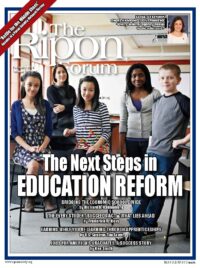 As we seek ways to strengthen our economy, lift up those living in poverty, and ensure that every person living in our great nation has access to the American Dream, a key part of the equation comes down to job training and technical skills.
As we seek ways to strengthen our economy, lift up those living in poverty, and ensure that every person living in our great nation has access to the American Dream, a key part of the equation comes down to job training and technical skills.
Many of the working poor and those living in poverty cannot afford to return to school, or simply do not have the time between working two or three jobs to support their family. So if an infusion of new jobs comes to their area, such as the manufacturing renaissance we are experiencing in my home state of South Carolina, these hardworking men and women are hard pressed to take advantage of those new opportunities.
Related to this, one of the most persistent problems facing our economy over the past eight years has been a declining labor force participation rate. Millions of Americans have simply given up attempting to find work, either because their skill set does not match the available jobs in their area, or they have become so frustrated with a stagnant economy they just stop looking. This decline comes even as there are more than five million open jobs across the country – jobs that many employers explain are unfilled because of a lack of available trained workers.
In response to these challenges, I am proud to have worked with my colleague Senator Cory Booker (D-NJ) on what we believe to be a strong solution – the Leveraging and Energizing America’s Apprenticeship Programs Act, or LEAP Act.
Apprenticeships are a proven way to help people develop in-demand skills and to meet the needs of employers, yet they comprise just 0.2% of the nation’s workforce
Apprenticeships are a proven way to help people develop in-demand skills and to meet the needs of employers, yet they comprise just 0.2% of the nation’s workforce. By 2020, the United States is expected to experience a shortage of 3 million workers with associate degrees or higher and 5 million workers with technical certificates and credentials.
Studies show that apprenticeships are a wise investment for both participants and the government: individuals who complete registered apprenticeship programs earn over $240,000 more over their careers than people who did not participate in such programs, and the tax return on every Federal Government dollar invested in registered apprenticeship programs is $27.
As we’ve seen in places like my home state of South Carolina, a strong program can help people accomplish great things. Because of our balanced approach in South Carolina, we have seen multi-national companies like General Electric and BMW, as well as many smaller businesses across the state, begin to use the program and provide new employment opportunities for individuals.
That’s why the LEAP Act is modeled after the Apprenticeship Carolina program, which is built on public-private partnerships for students along with a tax credit for job creators. The bill, which is fully paid for, has two main provisions:
First, it offers a federal tax credit for hiring new apprentices that are registered with the U.S. Department of Labor or a state apprenticeship agency.
Second, it addresses the fact that the average age of apprentices is currently as high as 29 by offering a tax credit of $1,500 for apprentices under 25. The tax credit for apprentices over 25 is $1,000.
Perhaps the most powerful tool apprenticeships give is simply the ability to earn while you learn.
When I visited MTU, an international diesel engine manufacturer with a production facility outside Aiken, South Carolina, I was able to learn firsthand from the employees and program participants just how important the program was to their families now and in the future. At Trident Technical College in North Charleston, I watched how their technical training matched with our growing aerospace industry. With such a wide variety of industries looking to utilize apprentices, from advanced manufacturing, to health care and information technology to our tourism industry, South Carolina has shown that programs like this offer limitless opportunity.
However, perhaps the most powerful tool apprenticeships give is simply the ability to earn while you learn. Whether you are a 22 year old living in poverty and looking for a way to improve your skillset, a 45 year old looking to change careers, or a high school student who does not necessarily want to get a four year degree, the ability to be able to provide for yourself and your family while improving your future earning potential is invaluable.
There has been an increased interest in apprenticeships over the past six months, with presidential candidates discussing their importance as well as high profile Members of Congress, and I am optimistic we will find a way forward this year. Our workforce is only as good as the tools we make available, and expanded apprenticeship programs would be a great addition to the toolkit.
Tim Scott is the junior United States senator from South Carolina.




